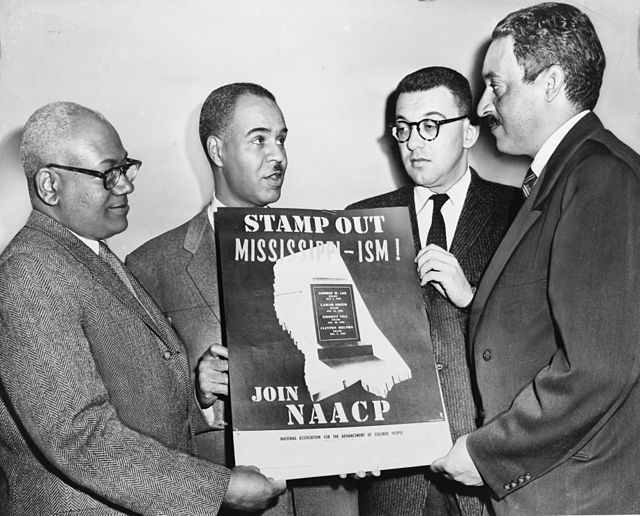Thoroughgood "Thurgood" Marshall was an American civil rights lawyer and jurist who served as an associate justice of the Supreme Court of the United States from 1967 until 1991. He was the Supreme Court's first African-American justice. Prior to his judicial service, he was an attorney who fought for civil rights, leading the NAACP Legal Defense and Educational Fund. Marshall was a prominent figure in the movement to end racial segregation in American public schools. He won 29 of the 32 civil rights cases he argued before the Supreme Court, culminating in the Court's landmark 1954 decision in Brown v. Board of Education, which rejected the separate but equal doctrine and held segregation in public education to be unconstitutional. President Lyndon B. Johnson appointed Marshall to the Supreme Court in 1967. A staunch liberal, he frequently dissented as the Court became increasingly conservative.
Official portrait, 1976
NAACP leaders Henry L. Moon, Roy Wilkins, Herbert Hill, and Thurgood Marshall in 1956
Marshall (center), George Edward Chalmer Hayes, and James Nabrit congratulate one another after the Supreme Court's decision in Brown v. Board of Education.
Marshall meeting with President Lyndon B. Johnson in the Oval Office of the White House on the day that Marshall was nominated by Johnson to serve on the Supreme Court
Brown v. Board of Education
Brown v. Board of Education of Topeka, 347 U.S. 483 (1954), was a landmark decision of the U.S. Supreme Court ruling that U.S. state laws establishing racial segregation in public schools are unconstitutional, even if the segregated schools are otherwise equal in quality. The decision partially overruled the Court's 1896 decision Plessy v. Ferguson, which had held that racial segregation laws did not violate the U.S. Constitution as long as the facilities for each race were equal in quality, a doctrine that had come to be known as "separate but equal". The Court's unanimous decision in Brown, and its related cases, paved the way for integration and was a major victory of the civil rights movement, and a model for many future impact litigation cases.
The members of the U.S. Supreme Court that on May 17, 1954, ruled unanimously that racial segregation in public schools is unconstitutional.
Chief justice Earl Warren, the author of the Supreme Court's unanimous opinion in Brown
U.S. circuit judges (from left to right) Robert A. Katzmann, Damon J. Keith, and Sonia Sotomayor at a 2004 exhibit on the Fourteenth Amendment, Thurgood Marshall, and Brown v. Board of Education







